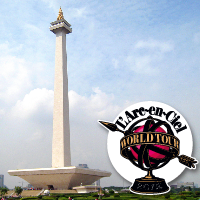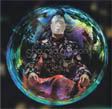I found this interesting article about Nino, from Los Angeles Times. Great job, Nino-kun! Watching some variety show Arashi in, I also found Nino as interesting character. I think Nino already beat Sho in my mind^^ Gomen ne Sho :P
***
January 28, 2007
WORLD CINEMA
The story is written on this actor's face
By Bruce Wallace, Times Staff Writer
Tokyo — Kazunari Ninomiya's face is unblemished, almost fragile, a porcelain slate of innocence onto which director Clint Eastwood projects the emotional toll of war in "Letters From Iwo Jima." Ninomiya plays Saigo, an apolitical baker conscripted into the doomed defense of the island, fighting not for the generals or the emperor but only to survive and return to his wife and infant daughter. Through his eyes we see battle, its cynicism, fear, the hatreds and pity. An unknown actor to American audiences, his face was perfect for Eastwood's Everyman.
***
January 28, 2007
WORLD CINEMA
The story is written on this actor's face
Kazunari Ninomiya, 23, expands an already long résumé as the "Iwo Jima" soldier onwhose visage war's toll is etched.
By Bruce Wallace, Times Staff Writer
Tokyo — Kazunari Ninomiya's face is unblemished, almost fragile, a porcelain slate of innocence onto which director Clint Eastwood projects the emotional toll of war in "Letters From Iwo Jima." Ninomiya plays Saigo, an apolitical baker conscripted into the doomed defense of the island, fighting not for the generals or the emperor but only to survive and return to his wife and infant daughter. Through his eyes we see battle, its cynicism, fear, the hatreds and pity. An unknown actor to American audiences, his face was perfect for Eastwood's Everyman.
But in Japan, Ninomiya is a mega-star, a face you can't avoid. This wisp of a 23-year-old has been in the business since he was 14. Big screen and small. Theater. A singer and dancer in Arashi (Storm), one of Japan's most popular male idol bands (and the Japanese love their idol bands). Ninomiya does TV commercials. He does radio shows, and he's a regular presence in Japan's mass-selling fan magazines. Even his voice is in demand, heard as one of the leading characters in the feature-length anime "Tekkon Kinkreet." The kid likes to work.
"It's different from wanting to be a star — I've always wanted to create something, I want to share the joy of creation with others," Ninomiya said between appearances last month for the Tokyo premiere of "Letters," which remains at the top of the Japanese box office weeks after release. The first screenings had left several young women in the audience in tears, though it was hard to tell whether they were crying over Saigo's story or from excitement when Ninomiya appeared on stage to take a bow with his costars after the credits. (hahahaa^^)
Cute? Well, yes
Creativity doesn't usually come high on the list of skills needed to succeed in Japanese pop culture, where cuteness is prized above all. Ninomiya is a product of the artist management company Johnny & Associates, founded in 1963 by California-born Johnny Kitagawa, which has produced the cutest of the cute in the boy idol industry.
With his stable of talent — talento as it is known here — Johnny's exerts extraordinary power over Japanese entertainment. Kitagawa's formulaically engineered idol bands, beginning with the Four Leaves in 1968 and continuing today with the omnipresent SMAP and a steady stream of other squeal-inducers like Arashi, don't just sing. Selected from thousands of auditioning teens, the idols are trained to dance, act and handle themselves on TV as part of Kitagawa's grooming for stardom. He uses established stars to leverage TV exposure for newcomers, a grip over the celebrity-thirsty networks that is commercially successful but also suggests that Johnny's is more factory than talent incubator.
Yet many here argue that Ninomiya is different from most of the cookie-cutter cuties of the idol world. He acted before he sang, debuting on stage rather than TV, in a production of "Stand by Me" at age 14. He had the River Phoenix role.
"Nino stood out early," says Julie Fujishima, a vice president at Johnny's. "He came to us to become a talento, but it was obvious he had a talent for acting." Fujishima says Ninomiya's breakthrough came in a TV drama called "Amagigoe" that aired on New Year's Day 1998. "He was very special, very good, and it got everyone's attention."
More TV dramas followed (TV tends to create bigger stars among Japanese fans than the movies do). And in 1999, Ninomiya became one of the five young stars selected by Johnny's to join Arashi, a J-pop troupe that made its singing and dancing debut on a cruise ship off Hawaii before it had a record out.
"I always liked singing," Ninomiya says. "When I was in the car with my family we'd always play music. I liked American bands, and I went to a Bon Jovi concert when they came to Tokyo Dome. Also Backstreet Boys. When I go to concerts by Japanese musicians, I tend to study them. But American musicians entertain me."
A string of Arashi hits predictably followed, though the relentlessly bland J-pop is not really about the music but about the look. It was Jun Matsumoto, with his ripped abs, who emerged as the band's biggest heartthrob, its Davy Jones, to use a Monkees analogy.
Arashi members have all cultivated different personalities for their fans, and Ninomiya is known as the "actor" in the group. He made his first movie in 2002, a supporting role in a drama called "Pikanchi, Life Is Hard, but Happy." He continued to find theater roles, playing the James Dean role of Jim Stark in a two-month run of "Rebel Without a Cause" in 2005.
And this month, he starts a TV series called "Dear Father," in which he plays an apprentice chef working for a tough Tokyo master. He laughs when asked if he can cook. "No," he says as he emerges from the set's kitchen during a break in the shooting, his hands wet from washing dishes. "But the work is fun."
"There's a real personality to his acting," says Rieko Miyamoto, the show's director. "He can act with his mouth and his eyes." So Ninomiya was an obvious candidate when Eastwood sent out a casting call to Japanese actors for "Letters From Iwo Jima." In addition to his talent, the studio calculated that Ninomiya's J-pop aura might drag a younger crowd to the box office, a tactic that has paid off to some degree, though Warner Bros. exit figures still show that the bulk of the movie's Japanese audience is in its late 30s to early 50s.
Audition tapes were sent across the Pacific to the late Phyllis Huffman, the casting director who had been a longtime Eastwood collaborator. Johnny's had another of its stars in mind for the Saigo role and Ninomiya was originally cast as Private Shimizu, the idealistic military policeman sent to Iwo Jima as punishment for showing mercy toward civilians. But Eastwood had not settled on his Saigo, and the director asked Ninomiya to read again for that part.
A personal connection
Like most young Japanese, Ninomiya had only a sketchy idea about the events at Iwo Jima in early 1945. Unlike most of his contemporaries, he at least knew where the tiny volcanic island is located because he has a map of Japan on the wall of his bathroom at home "and when I sit down, Iwo Jima is right in front of my eyes."
He went into the role the way Japanese soldiers went to battle: unsure of the fate that awaited them, suppressing their emotions. Japanese directors like to exaggerate emotions, he says, cranking up the tears and the music. "They make movies with greater and greater emotion, and it's not realistic," Ninomiya says. "So if you make a movie [like 'Letters'] that is based on reality, some people will find it uninteresting. They will say I should have cried more in certain scenes."
Ninomiya shed his tears after the film was in the can. His grandfather had been a soldier sent off to fight Japan's imperial wars. And he told his grandson about his war: stationed in the occupied Korean peninsula, taken prisoner by Soviet troops, incarcerated in Siberia.
Then the grandson, having played a suffering soldier facing slaughter in a hopeless cause, found himself one night watching another war drama on Japanese TV.
"I couldn't stop crying," he says. "I cried, because it was my grandfather's story."
bruce.wallace@latimes.com
source:http://www.calendarlive.com/movies/cl-ca-nino28jan28,0,3448987.story?coll=cl-movies






![KinKi Kids 32th single [変わったかたちの石]](http://img.photobucket.com/albums/v514/mij/KinKi%20Kids/kawatta.gif)




0 comments:
Post a Comment